- Home
- Joseph Bruchac
Brothers of the Buffalo Page 30
Brothers of the Buffalo Read online
Page 30
Established in my own state of Virginia—not far from the very plantation where I was born.
“Washington,” she had said to Wash two days before she left.
“Yes, Miss Bethany?” he had replied.
“You do know that it is only through education that we may help ourselves and our people?”
“Yes, I do.”
“So why do you not aspire to the same?”
He had felt his face grow warm. It was the last thing he had expected her to say. He’d been hoping for a fond farewell, a touch of her hand. But he had swallowed hard and managed a reply.
“Perhaps being a soldier is enough for some,” he’d said, more brusquely than he intended.
“Hmmph,” was her answer to that.
She had said no more that evening about his going to school. He thought his quick reply had scotched all thoughts in her mind of him being more than just another black cavalryman. But that had not been the end of it.
The next day, the day before she was to leave, he had been invited to dinner with the Brown family. He had gone, even though his heart had sunk lower than a snake’s belly. He sat, tongue-tied, hardly touching the food before him. He wanted to beg Bethany not to go as much as he wanted to congratulate her on the grand adventure upon which she was about to embark.
He finally managed the latter.
“I know you will do wonderfully well, Miss Bethany,” he said.
She nodded without even a smile, and his heart dug itself a hole six feet deep.
But then near the end of the evening, after Sergeant Brown had left the room, called to the back of their small shack by his wife on the pretense of helping her find something, the two of them were alone. Inwardly, Wash thanked them for the privacy while cursing his own inability to speak the words filling his mind.
“I...will miss you,” he managed to choke out, after taking a deep breath.
“Washington,” her voice had been so serious, yet with a surprising warmth in it. She had reached out her hand and placed it on his. “Will you write to me?”
The touch of her fingers had nearly reduced him to idiocy, but he choked out one word at least.
“Yes,” he whispered.
“Listen,” she said. “I see your future. I do. It is not here. Your mind is too fine to be wasted so. Others of our people are not only gaining education, they are changing this country so that our children will have a grand future with none of the impediments that held us back.”
She pressed something into his hand in place of her warm palm. It was her dog-eared copy of Romeo and Juliet.
“Washington,” she said in a husky voice, “we are not star-crossed lovers. There is a future for us, together. There is no need for me to ask, ‘Wherefore art thou?’”
That copy of Romeo and Juliet was in his breast pocket now. As he paused again in his climb, just short of the summit, he patted it with his palm. Then he shook his head.
Not the time to be lost in daydreaming. Keep your eyes open. It’s when you least expect him that old Death’ll be waiting for you over the hill. Wash, you are not yet ready to put on your traveling shoes and head for those Pearly Gates.
He’d now almost reached the top. But he did not stand up straight. That might make him a target silhouetted against the sky. He dropped down to crawl up behind a big rock and peered around it.
It was a grand view, almost as surprising as finding the Garden of Eden. Instead of the dreary worn yellows and reds and dull grays of the land behind, this was a sight as colorful as a rainbow. Below him was a box canyon, lush with growth. Green trees, still holding their leaves, rose all along a winding streambed of blue-green water flowing over stones that sparkled like gems. A misty waterfall sprang from the rocks below the crest and coursed down the mossy face of the cliff. The pale veil of water cascaded down to a deep blue pool below. In this unexpected oasis Wash saw dragonflies and other insects buzzing back and forth. He heard the songs of birds.
Then he saw motion. Something dark was coming around a bend in the canyon that hid whatever lay farther within its depths. Wash raised his rifle.
But it was no enemy. It was a yellow buffalo calf on long gangly legs. The very same color as the one Wash had carved from that piece of pine he’d picked up behind the carpenter’s shed. He’d planned to give that little carved buffalo to Bethany but had forgotten to do so. As a result, it still rested in the top of the ammunition pouch strapped to his side.
Head raised, the yellow calf’s big, innocent eyes took in the canyon and the waterfall before it, but it did not lift its gaze to where Wash was perched like an eagle on a pinnacle. A buffalo. The first buffalo he’d seen in many months, aside from the dried bones of those left on the plain by the hunters.
But it was not alone. Two more buffalo rounded the bend—a cow and another calf, a black one this time. More coming? Sure enough, a second cow and her brown calf appeared, the calf playfully butting its head against its mother. The yellow calf stopped drinking from the water of the stream and loped loose-legged over to butt heads and play with the other two. A wide smile came to Wash’s lips as he watched them rollicking back and forth, sending up sprays of water as they chased each other through the shallow end of the pool.
Suddenly a loud sound halfway between a snort and a bellow came from downstream. Even as high as he was, Wash could not make out what it was because the trees and the shoulder of the winding canyon cut off his view. The three cows swung around to stand side by side and face the direction of that warning cry. The calves trotted in to stand behind them. Wash’s hands tightened on his rifle.
Then what appeared around the corner almost made him laugh. It was the back side of a big bull buffalo. Pawing the earth, its head lowered, it backed toward the other animals. It was a comical sight. The front of the buffalo, with its massive hairy head, its dark eyes, its flaring nostrils, and its gleaming horns made its near-naked backside look weak and comical.
But why is it backing up?
Just one reason a bull would be acting like that. It was seeing a threat. Something or someone dangerous was coming that way. Wash raised his rifle to his shoulder, leaned his cheek against it, and took in a steadying breath, his finger firm on the trigger.
A lone Indian on his pony, bow in hand, came round the bend, following the buffalo. Wash did not move or make a sound, but somehow the Indian sensed something as the small Buffalo Solder sighted in on the center of his chest.
He lifted his head like a wolf sniffing the air, scanning the cliff top. Their eyes met.
A little smile came to the Indian’s lips. He sat up straighter on his horse. A warrior, ready to accept the lead gift Wash was about to give him. But instead of sending a .45 caliber bullet his way, Wash eased off on the trigger. It was his Indian, the tall one he’d first seen that day when they went after the horse thieves. The same young man who’d been with them when they met the chiefs coming back from Washington.
I am some kind of fool if I do what I am thinking of doing.
But he did it anyway. He turned the barrel of his gun to the side. He raised his right hand in the sign for peace. The Indian nodded up at Wash. He slung his bow over his shoulder and raised his hand, too.
Then the young man’s eyes dropped and he pointed the way Indians point. Not with his finger but with a little jerk of his chin. Wash turned his eyes that way. The little buffalo herd was making its way around the pool on a path so narrow a squirrel would have a hard time following it. They were heading straight for the waterfall. And they did not stop when they reached it. As water sprayed off their backs, they walked right into the falls. One after another, they went in.
The last to disappear was the big old bull, still walking backwards, keeping its footing even though it knocked free a few little stones that rolled down and fell off the edge into the pool. The last sign of it Wash saw was its massive head being pulled back through the curtain of the falls, water spraying off the tip of one horn before it was gone.
&nbs
p; Wash realized his hands were trembling and he was breathing deep. It felt as if some kind of powerful magic had just happened. Like something from one of Great-Grampa Hausaman’s tales from long ago.
Did this really happen?
His brain told him that there had to be a cave of some sort behind the waterfall. Yet the only thing that told him what he’d seen was real were the ripples crossing the blue pool from the stones knocked in by the big bull’s hooves. He looked back at the Cheyenne. Was he going to try to follow the buffalo, seeing as how he’d been hunting them?
But the young Cheyenne did not move. He just sat on his big horse, watching without twitching a muscle. A man might think them a statue were it not for the horse’s tail swishing back and forth.
Finally Wolf turned his head to look up at Wash. Even from fifty yards away, Wash could see that his Cheyenne friend’s cheeks were wet with tears.
Wolf patted his chest and then made a motion backward with his hand.
I am going, he was saying.
Wash made the yes sign with his index finger. Go.
Travel good, Wolf signed.
Travel good, Wash signed back.
The young Cheyenne man turned his pony and rode around the bend in the canyon without a backward glance.
Wash descended the way he had come.
As he hopped off the last big rock, he noticed for the first time that there were shapes packed into its face. Seven shapes like buffalo. Two men, one with a lance and one with a bow. A curving path in front of them.
“See anything?” Josh asked as he handed over Blaze’s reins.
“Nothing worth talking about,” Wash replied.
Long, long ago there was a young woman
who fell in love with the bright star.
She climbed to the top of the tallest tree.
That tree began to grow until it reached the sky land.
Bright Star was there. He took her as his wife.
And for a time they lived well together.
Before long it became clear that Bright Star’s wife
was soon to have a child.
Then one day as she was digging roots,
one big root came up and left a hole.
Through that hole, she saw the earth far below.
She thought of her mother and her family on
the earth below. She began to go out each day
to gather grass to braid into a rope.
One day she decided that rope was long enough.
She tied that rope to a stick, placed the stick across the hole, and began to climb down.
But that rope was not long enough.
She could not reach the ground.
She was too tired to climb up again.
Finally, she let go and fell.
That fall broke her to pieces, but the child
that was in her did not die. He was made of stone.
A meadowlark took pity on Stone Boy
and took him to its nest.
There he was raised with the young birds.
As they grew strong, he, too, grew strong.
Then the time came when the leaves began to fall.
The meadowlarks prepared to fly south.
My son, the father meadowlark said, we must leave,
and you cannot come with us.
My father, Stone Boy said, what must I do?
Go to your own people, the meadowlark said.
Then he pulled out some of his own feathers
and made Stone Boy four arrows and a bow.
Now go downstream. Your people are there.
There are things that you must do for them.
There are monsters that make life hard.
But those creatures will not be able to harm you.
You will destroy those monsters.
You will help the People.
CALLING OUT NAMES
The winter was the worst one Wolf had ever seen. It was terrible because they had lost their good lodge and blankets. It was made harder because food was so scarce. Their bodies were always exhausted because they had to keep running. Day after day they ran. Even when Cold Maker’s breath was heavy with ice and snow, the ve’hoe soldiers still kept after them.
At times, all that kept him going was the memory of that day of the seven buffalo. He would dream of that canyon. Sometimes in his dream he would ride into the waterfall after them. Rather than finding a cave, he would come out into a land as green and new as it had been in the first spring after Maheo made the world. Everywhere were great herds of sacred animals, eagles circled overhead, and the air was filled with birdsong. In that dream his whole family was with him, not only his mother and his sister but both of his fathers and his grandparents. Then he would sense someone beside him. He would turn to see his friend Horse Road there, a big grin on his face.
But then he would wake. He would find himself in the small, torn tipi that was all they owned. His mother and sister would be there shivering beside him. All four of them cut in half by hunger. And he would reach out then. He would wrap his arms around his sister shivering there between him and his mother. And somehow, sharing their warmth, they would live through another night.
At last, the Leaf Moon came. As they stumbled through the melting snow Wolf saw smoke. They rounded a small hill and saw many Cheyenne lodges. They had found their way back to their people.
An old man with a straight back and a smile on his face walked forward to greet them.
“My nephew,” he called. He opened his arms. It was Gray Head.
There were more than a hundred lodges in that camp. Gray Head, Heap of Birds, and Stone Calf had joined forces. But they had not done so to fight. They would never fight the ve’hoes again. They had joined together to surrender.
“We have sent messages to the soldier chiefs,” Gray Head said. “We have said that we will all come in. We have asked only that they do not kill us.”
Not all of the Striped Arrow People were trying to surrender. A few had chosen to go far to the north. There, northern cousins lived who were still strong enough to try to resist. Stone Forehead, Keeper of the Sacred Arrows, was among those who had decided to make that long journey north. He did not do so for his own safety. He did so to keep the Sacred Arrows away from the hands of the ve’hoes. That was a good thing. Those Sacred Arrows had long blessed their people.
“We are tired now,” Gray Head said. “Our few ponies have become too weak to run.”
Soon his mother and sister were speaking with girls and women they knew. Wolf watched them in admiration.
He had never heard his mother complain. She and his sister had seen so much sorrow. They had suffered so much. Yet now they were laughing and talking. His sister was cuddling a baby that had been born that winter. Somehow that child’s mother had kept the little girl alive.
How strong our women are. Without their strength, how could we men survive?
Wolf began to walk around the camp. He saw the faces of people he knew.
“Brother,” a familiar voice shouted. Then Wolf was caught in the tight embrace of two young men whose familiar faces made his heart feel good. It was Too Tall and Too Short. They sat and spoke of small things, of good times they remembered. They did not talk about friends who were gone. Then his friends told him the big news.
“The two ve’hoe sisters are with us,” Too Tall said.
“Stone Calf talked Medicine Water into giving them to him,” Too Short added.
“He did more than talk,” Too Tall said. “Stone Calf asked him if he was willing to fight the army on his own just to keep them.”
Many messages had been sent by the army to Stone Calf and the other peace chiefs. They had been told that no surrender would be accepted until the captive girls were returned. Now they could finally do so.
We have arrived at a good time, Wolf thought. Maybe we will finally find peace now. Maybe.
The next day an army scout arrived. To Wolf’s surprise, it was one of their own people. He had surre
ndered some time ago. Now he was working for the agency. His message was simple.
“The army men will come to your camp. They will arrange how you must surrender.”
“That is good,” Stone Calf replied. “Tell them we are ready.”
When Lieutenant Colonel James Neill and Agent John Miles arrived, Stone Calf rode out to meet them.
“We will give up our weapons and horses,” Stone Calf told them. “We will come into the agency and attend daily roll call. I will accompany a soldier ambulance back to the village to bring in the two white women.”
Agent Miles nodded. He was pleased. But Lieutenant Colonel Neill showed Stone Calf neither respect nor trust. The white soldier leader’s face turned red as he started to speak, and his words were as rough as the barking of a dog. He spoke so fast in English that Wolf could not catch all his words. But his tone was clear. He wanted to punish every Cheyenne. Punish them hard.
The war between us may be ending, Wolf thought, but what is coming now may not really be peace.
Several days passed. The Cheyenne camp was moved. They went to the place they were told to go, three miles from the Darlington Agency on the north fork of the Canadian River. White Horse and his Dog Soldiers were already there. They had come in along with their families two moons before. Their lodges were set up on the other side of the river.
A big band of ve’hoe soldiers was also there. Their camp was an arrow shot away along a hillside. There they had been living in dugouts that were cold and drafty and that looked much less comfortable than the Cheyenne tipis. The ve’hoes never spoke to an Indian unless they were giving orders. They never smiled.
Maybe they resent us for how they are being forced to live, Wolf thought. They are not happy to have to watch our every movement.
And that is what those soldiers did. They were always watching. Any time any Cheyenne tried to leave, the soldiers stopped them. They could not even go in to the agency for rations. Whatever food they got was doled out by those unfriendly soldiers. Things were not as good as Wolf had hoped.

 Peacemaker
Peacemaker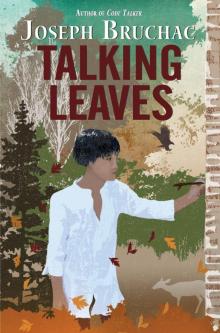 Talking Leaves
Talking Leaves Found
Found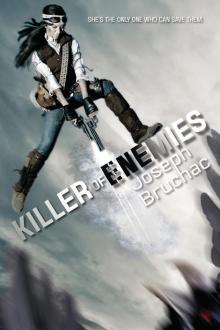 Killer of Enemies
Killer of Enemies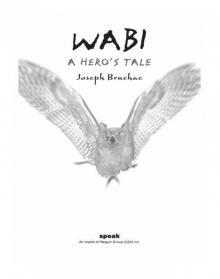 Wabi
Wabi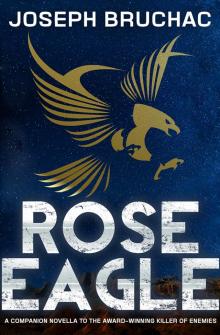 Rose Eagle
Rose Eagle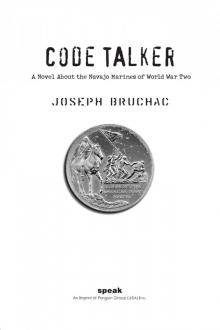 Code Talker
Code Talker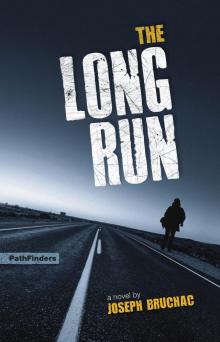 The Long Run
The Long Run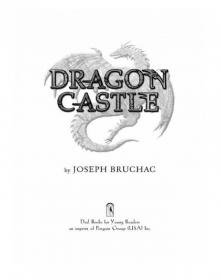 Dragon Castle
Dragon Castle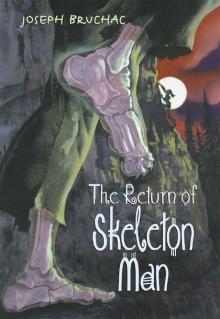 The Return of Skeleton Man
The Return of Skeleton Man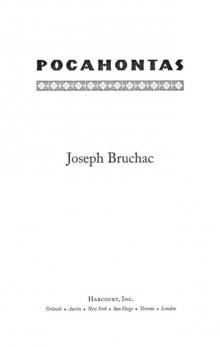 Pocahontas
Pocahontas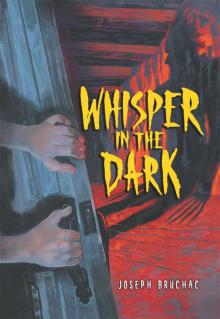 Whisper in the Dark
Whisper in the Dark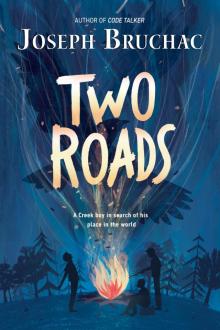 Two Roads
Two Roads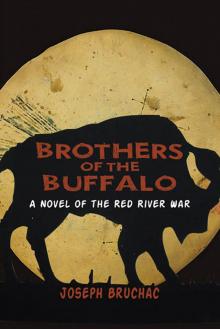 Brothers of the Buffalo
Brothers of the Buffalo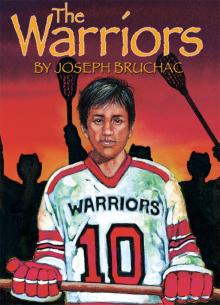 The Warriors
The Warriors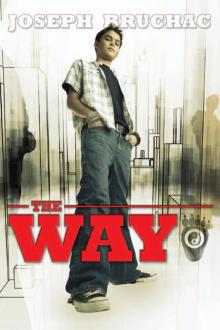 The Way
The Way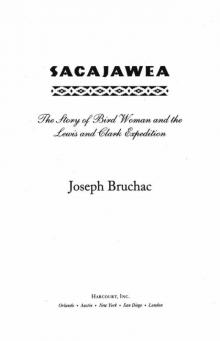 Sacajawea
Sacajawea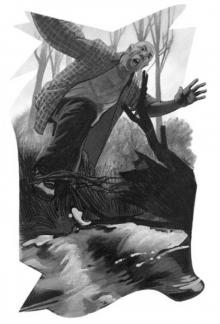 Night Wings
Night Wings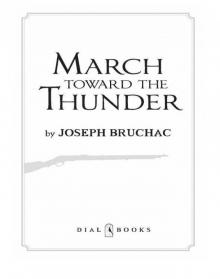 March Toward the Thunder
March Toward the Thunder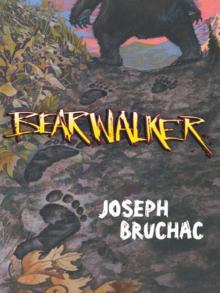 Bearwalker
Bearwalker Skeleton Man
Skeleton Man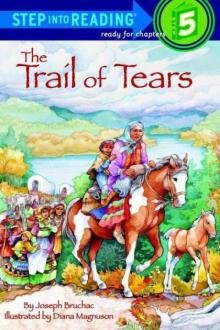 The Trail of Tears
The Trail of Tears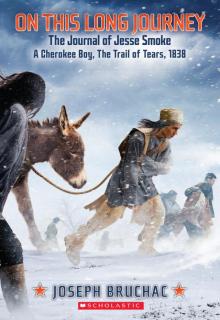 On This Long Journey
On This Long Journey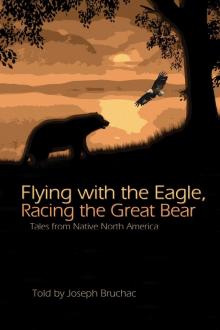 Flying with the Eagle, Racing the Great Bear
Flying with the Eagle, Racing the Great Bear